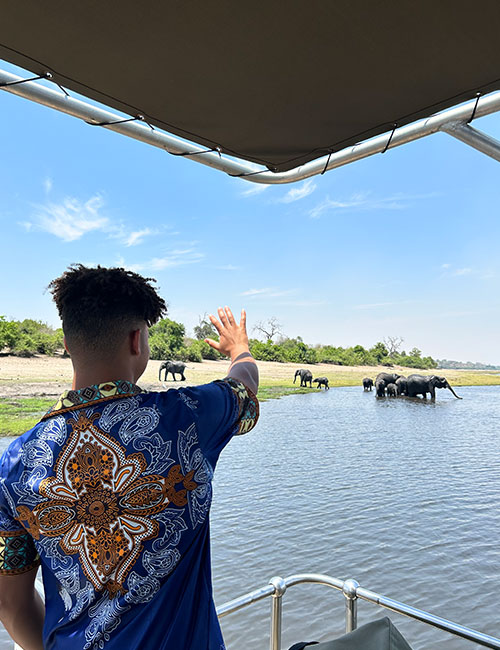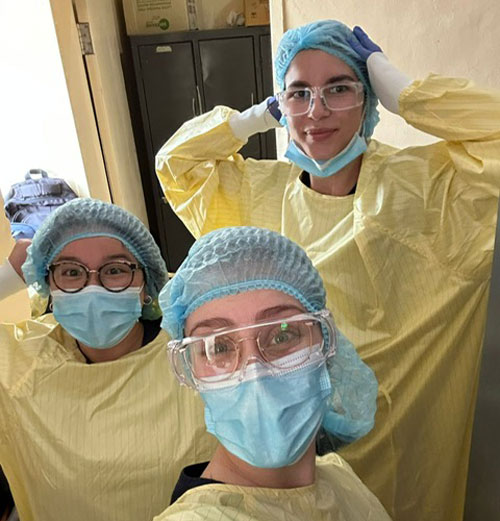
Nursing student Josiah Forde sits with Dr. Konoso Konoso at the Limulunga Health Center in Zambia.
For Josiah Forde, stepping into a bustling Zambian clinic for the first time was more than just another day in his global health practicum—it was the start of a life-changing partnership.
That’s because Forde and his six classmates weren’t just there to learn; they were there to exchange ideas and share knowledge within a global health context.
“The experience taught me to see patient care differently,” explains the undergraduate nursing student.

Forde is pictured at a sanctuary, which the students visited during their time in Zambia. Here he is wearing a shirt from a local vendor who he remembers as someone “who smiled a lot and loved hugs.”
“It was inspiring to see how the Zambian doctors and nurses cared for their patients with such resourcefulness. I also noticed they tended to focus on the primary health complaint, like a broken leg or a snake bite, versus just treating pain.”
During the five-week practicum—funded partly by UBC Go Global—Forde and his classmates gained valuable global nursing knowledge from their Zambian partners. These included health practitioners in hospitals, rural and remote health clinics, orphanages, schools and non-government organizations.
In turn, the seven undergraduate students could share their education and Canadian nursing practice with health professionals and patients in Zambia.


Practical experience builds nursing expertise
Forde’s classmate, Alyssa Spataro, long dreamed of becoming a maternity nurse and had the opportunity to be present for her first live birth in Zambia.

Spataro (back right) and her classmates scrubbing into the operating theatre before surgery.
“Maternity practicums in Canada are highly competitive, and today many families prefer smaller delivery teams, limiting opportunities for student nurses,” Spataro explains.
“In Zambia, I assisted in more than 30 births, which was an incredible experience.
“That really motivated me to pursue a maternity specialty when I returned from Zambia because I got so much hands-on experience.”
During their practicum, Forde and Spataro developed extensive nursing skills, from diagnosing tropical diseases like malaria to treating snakebites.
They learned specialized bracing methods for children living with spina bifida and cerebral palsy. They conducted HIV testing and performed countless blood draws in clinics. The female students also took on an additional role, leading educational sessions for young girls on menstruation and pregnancy.
No two days—or patients—were alike.
However, the most valuable lessons learned were those rooted in lived experience: empathy, understanding and compassion for patients.
“This trip will greatly influence my patient care,” says Forde. “If I can help my patient be pain-free, I’ll do everything in my power to ensure they don’t have to suffer.”
Adds Spataro: “Seeing the challenges and resource shortages faced by Zambian health-care workers has shaped me into a more compassionate and well-rounded person.”

The cohort of UBC Okanagan nursing students who travelled to Zambia, including Spataro (far left) and Forde (second from right).
Global health practicum strengthens nursing education
“The first cohort of nursing students went to Zambia in 2009, and we’ve been able to greatly expand the program since then,” explains Sheila Epp, an Associate Professor of Teaching at the School of Nursing.
“We work with Lewanika General Hospital and other health-care facilities in rural and remote areas, as well as schools and non-governmental organizations in western Zambia.”

Spataro (right, yellow gown) and her classmate are seen with their fellow Zambian healthcare workers as they prepare to scrub into an operating room.
Epp notes that the diversity of settings offers students invaluable insight into global health and cultural practices.
“It fosters a deeper empathy and thoughtfulness in their approach to patient care,” she explains.
For staff and patients at Lewanika General Hospital, the UBC Okanagan partnership has not only strengthened the standards of nursing services at the hospital, but has also meant the hospital can incorporate new trends in nursing practice and education through the presence of international students.
“This is a remarkable opportunity for both institutions,” explains Pelinna Phiri Chibanje, Principal Nursing Officer at the Western Provincial Health Office in Mongu, Zambia.
“What stands out for us is the deep collaboration with Sheila and her team. Their presence has brought fresh perspectives to my work, allowing us to exchange valuable experiences in nursing education and practice.”
Spataro couldn’t agree more. “It was such a respectful, reciprocal relationship where we both taught and learned.
“This experience has really changed my life for the better.”


